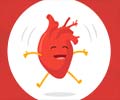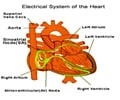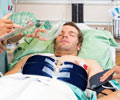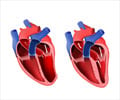Restrictive Cardiomyopathy
Restrictive Cardiomyopathy is associated with increased stiffness of the heart. The condition is most often the part of a multisystem disorder.
Causes
Common causes include:
- Infiltrative disease like amyloidosis or sarcoidosis
- Systemic storage disease like hemochromatosis
- Drugs toxicity like from Doxorubicin, Serotonin, Ergotamine
- Carcinoid syndrome.
Symptoms & Signs
Initial manifestation is a decrease in exercise capacity. In advance cases extreme fatigue and dyspnoea (Difficult or laboured respiration) at rest result.
Complications include damage to the lungs (pulmonary congestion) or liver; atrial fibrillation; ascites (Accumulation of serous fluid); peripheral oedema.
Diagnosis
Apart from the routine examinations already mentioned in the previous pages, Doppler echocardiography evaluation is of particular use here. Contrast echocardiography or magnetic resonance imaging may also be employed. The conditions that cause restrictive Cardiomyopathy are to be recognised early. For example the presence of abnormal amyloid protein signifies amyloidosis.
Treatment
Treatment targets both the underlying systemic disease and the heart failure itself. Diuresis has to be done carefully. Commonly used drugs include Angiotensin-converting enzyme inhibitors (ACE inhibitors) and â-blockers.

























